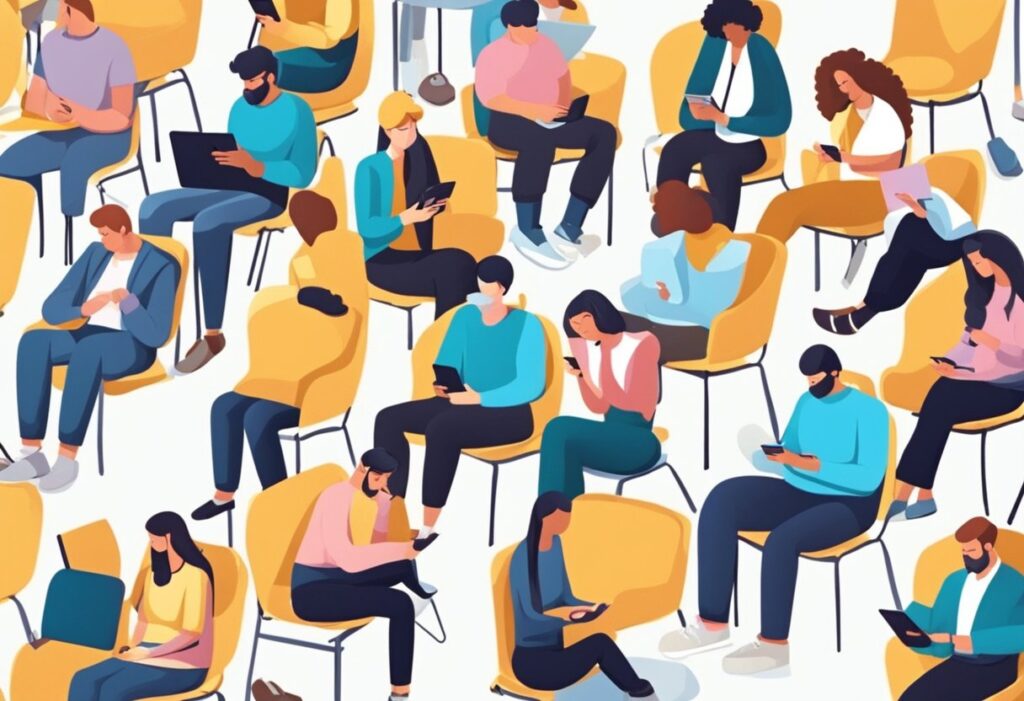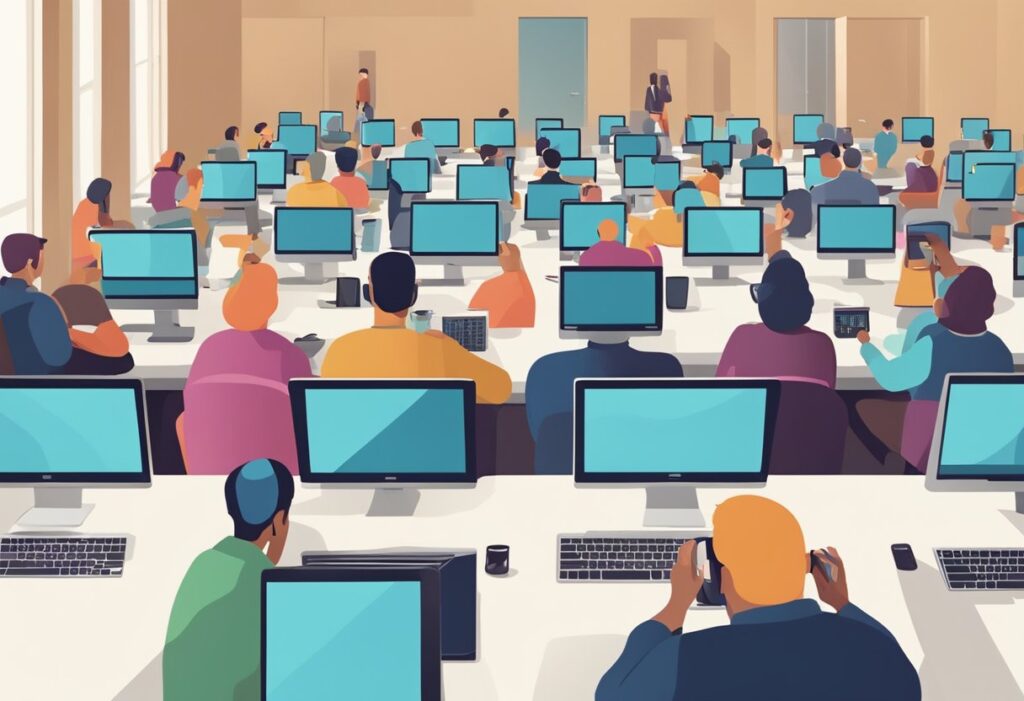Social media has become an integral part of our lives, and it’s hard to imagine a world without it. We use social media to connect with friends and family, share our thoughts and experiences, and stay up-to-date with the latest news and trends. However, there is growing concern that social media is making us unsocial and that it’s hindering our ability to form real, meaningful relationships.

As someone who has spent a lot of time on social media, I can attest to the fact that it can be addictive and isolating. It’s all too easy to get lost in the endless scroll of our newsfeeds, and before we know it, hours have passed without us having any real interaction with the people around us. Studies have shown that social media use is linked to increased feelings of loneliness and depression and that it can even lead to a decrease in overall life satisfaction.
While social media has its benefits, it’s important to recognize that it can also have negative consequences. As we become more reliant on social media to connect with others, we may be missing out on the benefits of face-to-face interaction. We may also be losing our ability to empathize with others, as social media can create an echo chamber where we only hear opinions that align with our own. It’s clear that we need to find a balance between our online and offline lives, and that we need to be mindful of how social media is affecting our relationships.
The Paradox of Social Connectivity

As social media continues to dominate our lives, we are becoming increasingly connected to a vast network of people, ideas, and information. However, this connectivity comes at a cost, and the paradox of social connectivity is that it makes us unsocial. In this section, I will explore the two main reasons why social media is making us unsocial.
The Illusion of Being Social Media Making Us Unsocial
One of the main reasons why social media is making us unsocial is that it creates an illusion of social connectivity. We may have hundreds or even thousands of “friends” and “followers,” but these connections are often superficial and lack the depth and intimacy of real-life relationships. Social media platforms are designed to keep us engaged and addicted, and the constant notifications, likes, and comments give us a false sense of connection and validation. However, this illusion of being social can lead to feelings of loneliness, isolation, and depression.
Read Now This Article about the Flag of Norway: Read More
Online vs Offline Interactions
Another reason why social media is making us unsocial is that it is replacing offline interactions with online ones. While social media can be a great way to stay in touch with friends and family who live far away, it is no substitute for face-to-face interactions. Studies have shown that excessive use of social media can lead to a decrease in real-life social interactions. This can hurt our mental health and well-being, as humans are social creatures who thrive on social connections.
In conclusion, while social media has its benefits, it is important to recognize the paradox of social connectivity. We must be mindful of how social media is making us unsocial and take steps to cultivate real-life relationships and interactions. By doing so, we can strike a balance between the benefits of social media and the need for genuine human connection.
Psychological Impact of Social Media
Social media has become an integral part of our daily lives. It has changed the way we communicate and interact with each other. However, research has shown that excessive use of social media can have negative psychological effects on individuals.
Social Skills Deterioration
One of the most significant impacts of social media is the deterioration of social skills. Social media platforms provide an easy way to communicate with others without the need for face-to-face interaction. However, this ease of communication can lead to a lack of social skills, especially in younger generations who have grown up with social media. According to a study by Twenge et al. (2018), high users of screens were more likely to have difficulty with face-to-face social interactions.
Feelings of Loneliness and Depression
Another psychological impact of social media is the feeling of loneliness and depression. Social media can create a false sense of connection and belonging. However, this connection is often superficial and does not replace the need for real-life social interaction. According to a study by the American Journal of Preventive Medicine, social media use is associated with increased feelings of social isolation and depression.
In conclusion, social media has undoubtedly changed the way we communicate and interact with each other. However, excessive use of social media can have negative psychological effects on individuals. It is important to use social media in moderation and balance it with real-life social interaction to maintain good mental health.
The Role of Social Comparison

As social media usage has become more widespread, the negative impact of social comparison on mental health has become more apparent. Social comparison refers to the tendency to evaluate oneself about others, and social media has made it easier than ever to compare ourselves to others.
Envy and Low Self-esteem
One of the most significant negative effects of social comparison on social media is the development of envy and low self-esteem. When we compare ourselves to others on social media, we often see only the best parts of their lives. This can lead to feelings of inadequacy and low self-esteem, as we compare our own lives to the seemingly perfect lives of others. According to a study published in the Journal of Computer-Mediated Communication, social comparison on social media is linked to increased feelings of envy and decreased self-esteem.
The Highlight Reel Effect
Social media often presents a skewed reality known as the “highlight reel effect.” This effect occurs when people only share the positive aspects of their lives on social media, creating an unrealistic view of their lives. This can lead to feelings of inadequacy and low self-esteem when we compare our own lives to the seemingly perfect lives of others.
To combat the negative effects of social comparison on social media, it’s important to remember that social media only presents a small part of people’s lives. We should try to focus on the positive aspects of our own lives and not compare ourselves to others. Additionally, we can limit our social media usage and focus on building real-life relationships and experiences.
Effects on Real-Life Communities

Decline in Local Social Participation
Social media has become a significant part of our daily lives, and it has changed the way we interact with each other. One of the most significant effects of social media is the decline in local social participation. Social media platforms have made it easier for people to connect with others online, but it has also made it easier for people to avoid face-to-face interactions.
According to a study by the Pew Research Center, 28% of Americans reported that they rarely or never meet with their neighbors. This decline in local social participation can have significant consequences for communities. When people do not interact with their neighbors, it can lead to a lack of social cohesion and a breakdown in community relationships.
Weakening of Family Bonds
Another significant effect of social media is the weakening of family bonds. Social media has made it easier for people to stay connected with their friends and family members who live far away, but it has also made it easier for people to spend less time with their loved ones.
According to a study by Common Sense Media, 47% of parents reported that their children’s use of social media has hurt their family time. Parents reported that their children spend less time interacting with family members and more time on their phones or computers. This weakening of family bonds can have significant consequences for families. When family members do not spend enough time together, it can lead to a breakdown in communication and a lack of emotional support.
In conclusion, social media has had a significant impact on our real-life communities. It has led to a decline in local social participation and a weakening of family bonds. While social media has many benefits, it is essential to be aware of its negative effects and take steps to mitigate them.
Counterarguments and Potential Benefits
While social media has been criticized for making us unsocial, some counterarguments suggest it can strengthen long-distance relationships and provide networking and professional opportunities.
Strengthening Long-Distance Relationships
Social media allows us to stay connected with friends and family members who live far away. Through platforms like Facebook, Instagram, and Twitter, we can share updates, photos, and messages with loved ones in different parts of the world. This can help us maintain meaningful relationships despite the physical distance.
Moreover, social media has made it easier to communicate with people during times of crisis, such as natural disasters or pandemics. During the COVID-19 pandemic, for instance, people have used social media to stay connected with friends and family members while practicing social distancing.
Networking and Professional Opportunities
Social media can also provide networking and professional opportunities. LinkedIn, for example, is a social media platform that is specifically designed for professionals. It allows users to connect with colleagues, mentors, and potential employers, and to showcase their skills and accomplishments.
Moreover, social media can be a valuable tool for entrepreneurs and small business owners. Platforms like Instagram and Twitter allow businesses to reach a wider audience and engage with customers in new and innovative ways. This can help businesses grow and thrive in an increasingly competitive marketplace.
While it is important to be mindful of the potential downsides of social media, it is also important to recognize the potential benefits. By using social media responsibly and intentionally, we can stay connected with loved ones, advance our careers, and build meaningful relationships with others.


1 thought on “The Unsocial Dilemma: How Social Media Making Us Unsocial”
Pingback: Jar of insecurities template - Learn how to make It